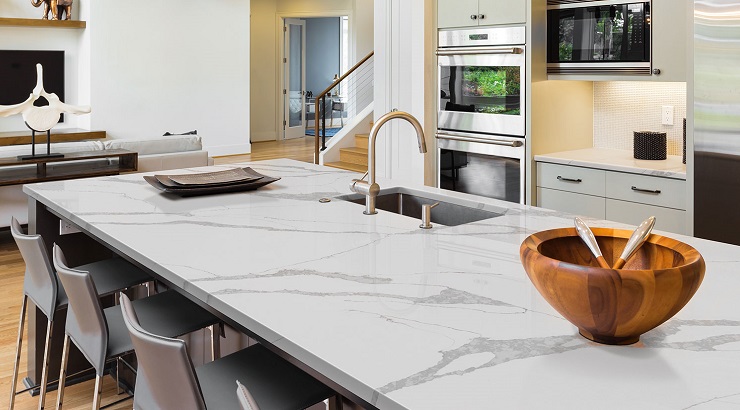Features
A Guide to Buying Quartz Countertops
Everything you need to know about quartz countertops.

Made from quartz – one of the toughest minerals in the universe – quartz countertops are a popular choice for homeowners looking for durable and reliable countertops.
Let’s start this guide by defining a countertop.
A countertop is a flat horizontal surface designed for working in a kitchen, bathroom, lavatory, or workstation. It is fitted on top of cabinets at a comfortable height for the user.
Countertops are made of various materials depending on the desired functionality, and aesthetics – with quartz being a popular choice due to its strength and availability.
Quartz countertops are often referred to as ‘man-made’ or “engineered’, despite quartz being a natural stone since they are made from particles of quartz fused with resins.
Indeed, quartz countertops are made using 95% quartz and 5% polymer resins.
The amount of quartz in a countertop is determined by the manufacturer, with Cambria Quartz – one of the top producers of engineered quartz surfaces in the U.S. – offering some of the highest concentrations of natural quartz.
Quartz Vs. Granite
Like quartz, granite is a hard natural stone that is mined from quarries around the world, broken into small manageable pieces, and then refined to a satisfactory texture.
Both materials have their pros and cons, but generally, quartz is harder than granite and hence more durable, low maintenance and it does not chip easily.
Quartz is almost indestructible and since it is not permeable like granite, it is easy to keep the countertop free of bacteria.
Quartz countertops are generally more expensive than granite countertops.
Quartz Countertop Cost
Depending on the quality, thickness, elegance of edging and size of the workstation, it costs an average of $3,000 to $7,500 to install a quartz countertop in a kitchen.
You should expect to pay about $60 to $90 per square foot, including installation.
It is possible to lower quartz countertop prices by doing some of the preparation work. However, because engineered quartz is heavier than other stone surfaces a qualified installer should examine the surface to determine its structural strength.
White Quartz Countertop
As the name suggests, the white quartz countertop is white. These countertops are a clean and modern choice for any design. However, many homeowners are intimidated by white quartz countertops for obvious reasons: white objects show dirt and stain quite easily.
RELATED: How to Redesign Your Kitchen on a Budget
That being said, the white quartz countertop has remained popular among homeowners due to its classy look, and the fact that white lends itself to modern, minimalist interiors.
Is Quartz Countertop Best for You?
Before you decide to install a quart countertop in your house, it is important to carefully consider the pros and cons of quartz countertops.
The Pros
1. Quartz countertop offers great design options.
Thanks to the resin that binds ground quartz together, quartz countertop manufacturers can bend and shape the countertops into sinks or the sides of curved islands.
Besides, resin allows cleaner cuts without chipping as most natural stones do.
2. Quartz countertop is low-maintenance.
Unlike natural stone, a quartz countertop does not require sealing. This means you only need to wipe with soapy water for upkeep.
Besides, you just need to use a gentle cleaning scrub to eliminate stains.
However, you should avoid using scouring pads as they can make the surface dull. Also, avoid harsh chemicals as they can break down the bond between the quartz particles and resins.
3. Quartz countertop is antimicrobial.
Plastic resin binders help to make quartz countertops nonpermeable. As such, stain and odor-causing bacteria, mold, and fungus cannot penetrate the surface of the countertop.
The Cons
1. Quartz countertops are expensive.
When compared with wood, concrete, and laminate, which cost less than $10 per square foot, quartz is quite expensive – at $60 to $90 per square foot, including installation costs.
2. Quartz countertops can’t handle extreme heat.
While quartz countertops are made to withstand heat, they can only do so to a certain point.
Most countertops are designed to handle up to 400 degrees Fahrenheit. Beyond this point, the surface of the countertop may develop some cracks.
3. Quartz countertops can’t withstand direct sunlight.
Quartz countertops are meant for indoor installation. You void your warranty by fitting your countertop in an open area. The scorching heat of the sun can cause colors to fade.
With time, exposure to direct sun causes the quartz countertop to twist or split.














